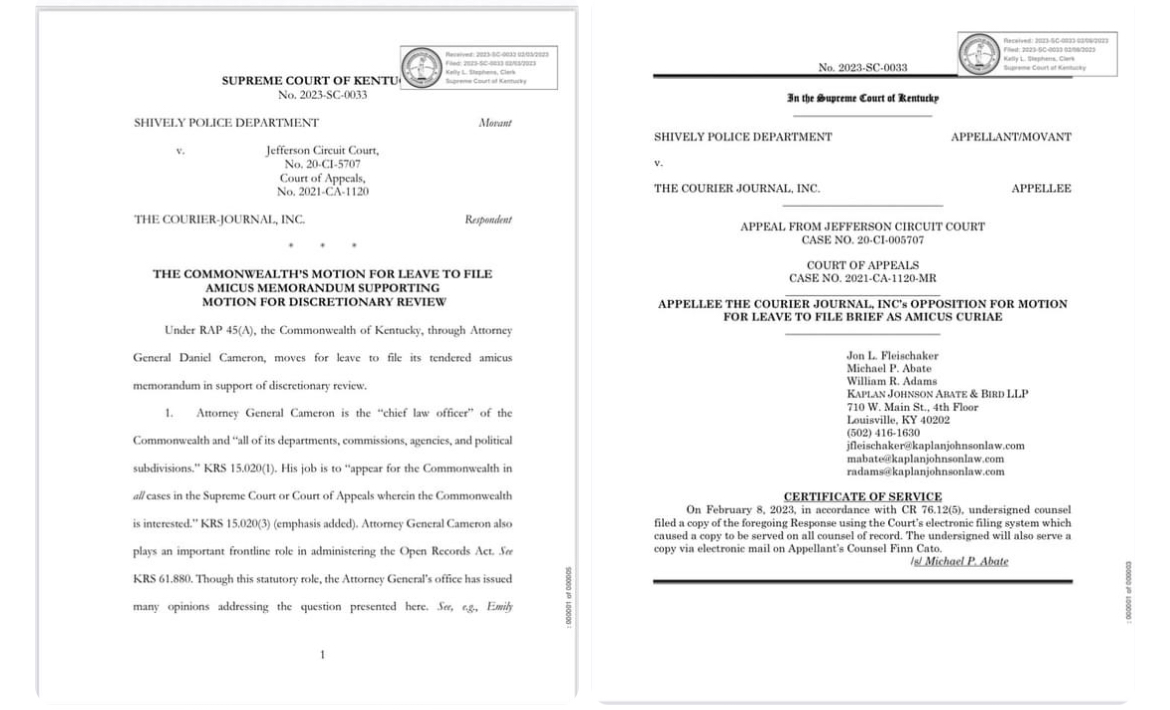
Attorneys for The Courier Journal express understandable consternation in their reply to the Office of the Kentucky Attorney General’s Motion for Leave to File Amicus Memorandum Supporting Motion for Discretionary Review in Courier Journal, Inc. v Shively Police Department.
In the referenced November 10, 2022, Court of Appeals’ opinion, a unanimous panel declared:
“[G]eneral allegations of potential harm which would seem to apply in any criminal investigation” are not sufficient to justify wholesale denial of an open records request for records relating to an open investigation.
http://opinions.kycourts.net/COA/2021-CA-001120.PDF
The opinion ended law enforcement agencies’ longstanding claim that all records in an open investigative file are exempt from disclosure until investigation and prosecution is concluded. The law enforcement agency could properly withhold a record or records if it could identify concrete harm from disclosure.
The linchpin in the analysis was the court’s rejection of the Shively Police Department’s argument that KRS 17.150(2) “essentially swallow[s] up the
limitations contained in the KRS 61.878(1)(h) exemption,” specifically, a showing of concrete harm from disclosure of records in an open investigation.
https://apps.legislature.ky.gov/law/statutes/statute.aspx?id=51393
https://caselaw.findlaw.com/ky-supreme-court/1643297.html
KRS 17.150(2) is the statute on which law enforcement agencies have relied to deny access to records in cases where they could identify no harm to the investigation from disclosure of those records.
https://apps.legislature.ky.gov/law/statutes/statute.aspx?id=46877
The court concluded that KRS 17.150(2) “does not apply to justify the withholding of records” where a determination to prosecute has been made and the prosecution is not yet completed — in other words, where a case is open.
Daniel Cameron is not the first attorney general to adopt the erroneous interpretation of KRS 17.150(2) repudiated by the Court of Appeals — over the heated objections to that erroneous interpretation by the open records staff — but he is the first to “participate as a partisan in [an open records] appeal.”
Writing in opposition to the Attorney General’s motion to file a brief in support of the Shively Police Department’s request that the Supreme Court review the Court of Appeals’ opinion, Courier attorneys Jon Fleischaker, Michael Abate, and Rick Adams assert:
“While it may not seem unusual for the Attorney General to participate as amicus before this Court, it is highly unusual for the Attorney General to seek to do so in an Open Records Case. And there is good reason for that. In the system created by the General Assembly, the Attorney General’s office is supposed to serve as a neutral arbiter for administrative appeals, allowing members of the public and media to quickly and inexpensively hold agencies to account for denying records requests. It is not supposed to be an advocate when those interpretations are challenged in court.”
“The Attorney General has now abandoned that neutral role.”
The Attorney General’s action is unprecedented. In my 25 years as an assistant attorney general, I witnessed nothing comparable.
The Attorney General was invited to offer assistance in drafting a 2005 statute assigning a new role to distribute informational materials about open records and open meetings to named officials. He was invited to assist in the drafting of the homeland security exception prior to its enactment in 2005. He was invited to participate in an open meetings and records task force in the early 90’s. He may have been invited to participate in drafting the 2018 body-cam video statute enacted after my departure from the office. But he assiduously avoided advocacy for or against pending legislation, and never —to my knowledge — attempted to interpose himself in a pending case to advocate against the public’s right to know.
The single instance in which an Attorney General intervened in active open records litigation occurred in 2017 when then Attorney General Andy Beshear intervened in Western Kentucky University’s open records lawsuit against The College Heights Herald to "prevent the unlawful refusal of Western Kentucky University to abide by the Kentucky Open Records Act, specifically, KRS 61.880(2)(c) and 40 KAR 1:030 . . . [by] withholding the requested documents from the Attorney General, for the purpose of substantiating the University’s denial of The Kernel’s and College Heights Herald’s open records requests, severely impair[ing] the ability of the Attorney General to make a reasoned Open Records Decision."
https://www.ag.ky.gov/pdf_news/20170323_Motion-to-Intervene_Complaint_E…
Simply put, Beshear sought to enforce his authority to confidentially review the records in dispute in a pending appeal under the cited statute and regulation -- not to abdicate his role as a neutral open records adjudicator but to secure that role.
In October, 2020, “at the request of Daniel Cameron, the state’s attorney general,” the Warren Circuit Court dismissed Beshear’s intervening complaint in the Western Kentucky University v The College Heights Herald.
https://wkuherald.com/13749/news/attorney-general-intervening-complaint…
That is the sum total of the known (public) involvement of the Kentucky Attorney General in past open records disputes involving legislation or litigation.
With the submission of this motion to the Supreme Court to file a brief in support of the Shively Police Department’s motion for discretionary review of the critically important Court of Appeals’ opinion against it, and in favor of The Courier Journal, Attorney General Cameron has, indeed, abandon all pretense of neutrality.


